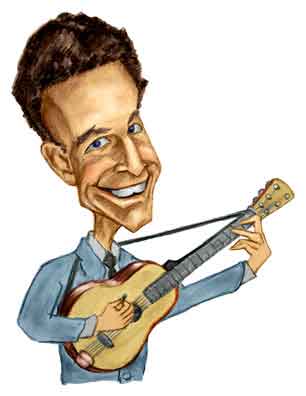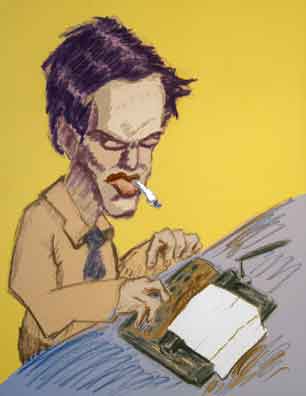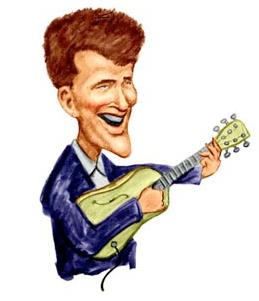Lonnie Donegan
The King of Skiffle

Lonnie Donegan
The King
Q. Lonnie WHO!!!!!??????
A. Lonnie Donegan.
Q. The King of WHAT!!!!!??????
A. The King of Skiffle.
Q. And just what the hey is THAT!!!!!??????
Well, young fellers and ladies, jest let ol' CooperToons put his teeth in, rub in some lumbago ointment, set back in his rocker, and he'll tell you all about skiffle.
Skiffle was a variety of folk music popular in Britain in the 1950's and which spilled a bit into early 1960's. Using common acoustical instruments - guitar, banjo, upright bass, and drums, but with electrical amplification soon to creep in (particularly on lead guitar) - it was characterized by fast tempos and a bouncy toe tapping beat. To this day the tunes are so snappy that recently one of Lonnie's song was played on the popular British comedy/quiz program Qi, the audience spontaneously began to clap along.
Oddly enough, the folksongs of the UK were not much in the skiffle repertoire. Instead, the skifflers drew on American folk traditions, and many of the skiffle tunes were taken directly from the collecting and field work of then Library of Congress folk musicologist Alan Lomax. In fact, two of Alan's discoveries - Huddie Ledbetter (Leadbelly, of course) and Woody Guthrie - were composers Lonnie favored. So with Lonnie putting Leadbelly's "Rock Island Line" at the top of the UK Pop Charts and performing Woody's "Grand Coulee Dam" on the telly, it's no coincidence that Alan headed to England when the 1950's - quote - "patriotic" - unquote - congressional activities of Joe McCarthy and the HUAC (plus a less than satisfactory marriage) drove him out of the Land of the Free and Home of the Buck.
Unlike the folk purists that cropped up in the early 1960's, skiffle musicians made no pretense of producing the "authentic" folk sound. Far from it. The music was simply intended to be enjoyed, not to publicize the suffering of the downtrodden masses to the privileged populace. So starting in the early 1950's for about ten years, skiffle groups popped up all over the UK.

Alan Lomax
It was the perfect combination of expert musicianship and the sheer exuberance of his performances that crowned Lonnie Donegan the King of Skiffle. Lonnie was also smart enough to have top flight sidemen which often included Les Bennetts as his lead guitarist. Compare the skill of Les and Lonnie's other sidemen to others of the genre and you'll see - well, you'll see there's no comparison.
But sad to say, in the days before satellite TV, Americans (with their own rock culture) mostly heard only Lonnie's occasional novelty tunes, "Does Your Chewing Gum Loose It's Flavor On the Bedpost Overnight" or "My Old Man's a Dustman". A poor sampling, indeed, for a musician who put 34 tunes on the UK Charts from 1956 to 1962 with a number of them hitting the top. In Merry England, though, Lonnie's hits were mostly straightforward folk tunes, and the fans loved them.
Skiffle faded as the boy-meets-girl "Last Kiss" rock and roll morphed and fragmented into hard rock and the protest song of the 1960's which in their turn were transformed into the overly choreographed concerts and (ugh) music videos so ubiquitous today. By the mid-decade Lonnie's records were becoming hard to find, and in the US they were practically non-existent.

Less Bennetts
Lonnie's Sideman
No Comparison
But Lonnie was never completely forgotten and he always had a loyal fan base. He was also an astute businessman in the music industry, and you don't need to worry about how Lonnie made out (he did fine). Some of his own compositions were even recorded by guys like Tom Jones and Elvis Presley (whoever they were).
Then with the British invasion of 1964, reporters would ask the young British rockers who they looked up to and who were their major influences. Although the names tossed out were often American - musicians and songwriters like Carl Perkins, Bo Diddley, and Buddy Holly - they'd also cite their fellow countryman, Lonnie Donegan. So throughout the 1960's you could still sometimes hear a Lonnie Donegan tune played over the ether.
It was high technology that eventually brought Lonnie back. With the economically manufactured compact disc bringing niche markets back to the record stores, sure enough, in the better places you might find a Lonnie CD bin. Lonnie himself even made something of a comeback and toured the world before and after the turn of the millenium.
But it seems we may have taken one step forward only to take two back. Try taking a poll amongst your friends and co-workers, and you'll probably find the name Lonnie Donegan - and even skiffle - drawing mostly blank looks. Ragtime, jazz, blues, swing, and even jitterbug, people have heard about. But not skiffle.
Sadly Lonnie is no longer with us. He died in late 2002 while on a UK tour. But at least Lonnie wound up with an MBE, although considering his influence we really should be talking about Sir Lonnie. And with the internet only a mouse click away, you can have a Lonnie Donegan CD speeding your way or have his tunes digitally downpouring onto your hard drive.
There were never any contenders with Lonnie as the King of Skiffle. No one else even came close. But as in rock today, there were many lesser known and local bands. In Liverpool a fledgling skiffle group started up in the mid-1950's. Called the Quarrymen, it had some minor local success before three of their members - John Lennon, Paul McCartney, and George Harrison - renamed the group, picked up a drummer named Ringo Starr, and moved on to other things.